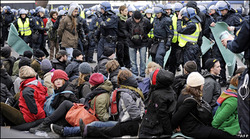Copenhagen police detain 200 climate protesters
Danish police cracked down on protesters outside the UN climate conference in Copenhagen Sunday, detaining more than 200 people as global environment ministers met for informal talks.
Riot police halted an unauthorized march that tried to make its way to the Copenhagen harbour, said police spokesperson Flemming Steen Munch.
According to Munch, police conducted security checks of some of the protesters, and found bolt-cutters and gas masks during the search of a truck that led the demonstration.
At least 200 people were detained, Munch said.

The latest arrests came hours after police announced that they released nearly all of the 1,000 protesters they detained Saturday during a mass climate-change demonstration.
According to police, only 13 of the 968 people detained during Saturday's protest remained in custody on Sunday. Three are scheduled to appear in court to face charges of fighting with police.
Police estimated 40,000 people marched through the city to the suburban conference centre where the talks are taking place.
While the protest was largely peaceful, dozens of riot police were on hand to manage the crowd. They arrested activists who they say were near the back of the crowd of marchers when they began to vandalize buildings.
Police say windows were broken at the former stock exchange and at the Foreign Ministry.
An officer suffered minor injuries when he was hit by a rock, while a protester was injured by fireworks, Munch said.
Protest organizers criticized the arrests.
"They have arrested 1,000 people, and they only followed up on 3 of them," protest spokesperson Ida Thuesen said. "There are lots of people who haven't done anything and had no intention of doing anything."
At the same time, church bells in Denmark and other countries rang 350 times to represent the figure many scientists believe is a safe level of carbon dioxide in the air -- 350 parts per million.
Churches across Denmark rang their bells, as did about 300 churches across Sweden, and others from Fiji to the United States and Canada.
Although Sunday was a day off for conference delegates, more than 40 environment ministers met for informal talks at the Danish Foreign Ministry.
Also on Sunday, Christian leaders from around the world held an ecumenical service devoted to climate change.
The service was led by Archbishop of Canterbury Rowan Williams at Copenhagen's Lutheran cathedral.
Archbishop Desmond Tutu of South Africa was also present, alongside religious leaders from Tuvalu, Zambia, Mexico, Greenland and Denmark.
At Sunday's meeting, the ministers discussed issues such as cuts to greenhouse gas emissions and financial aid for developing nations to help them combat and cope with climate change.
Canada's Fossil Awards
At the talks, Canada is being perceived as a barrier towards coming to an agreement, and has won at least five Fossil Awards -- prizes meant to embarrass countries that are seen to have dragged their feet on the climate change issue.
The prizes are given by a coalition of environmental groups.
Canadian Green Party Leader Elizabeth May, who is in Copenhagen, told CTV's Question Period that Canada has lost its reputation as a global leader on the environment.
"We're generally seen here to be a non-participant, not an important player because our role has only been to obstruct progress," she said. "It's very sad compared to where we used to be in terms of our international reputation."
Political analysts are accusing the Canadian government of following the United States' lead on how to fight climate change.
Canada's Ambassador to the U.S., Gary Doer, said following the Americans' lead "makes sense."
"Certainly it makes sense for Canada and the U.S. to be working in harmony, whether it's the acid rain agreement a number of years ago, or the new tailpipe emission standards across our two borders, it makes sense to work together," he told Question Period.
He said that it is not clear yet if regional, ideological, and other differences in the U.S. senate could hamper a proposed U.S. cap and trade deal and whether this could affect Canada's position.
"There may be an agreed upon target and there may be different ways to get there. I think that's still an unknown question," he said, explaining Canada also needs to watch what initiatives developing nations like China and India take, and not just the U.S.
He also said that coming up with a deal will likely be the easier part of the process.
"It won't be just a manner of signing something," he said. "It'll be a lot of effort in implementing it."
A draft accord, released Friday at the summit, calls for wealthy nations to cut emissions by 20 to 40 per cent by 2020. This would pave the way to reaching a broader goal of reducing worldwide greenhouse gas emissions by 50 to 95 per cent over the next 40 years.
To achieve both goals, 1990 emissions would be used as the baseline year.
However, representatives from the U.S., the European Union, Japan and Australia balked at the figures and criticized the pact for failing to address greenhouse gas emissions by emerging economies.
India has pledged to cut its greenhouse gas emissions by 20 to 25 per cent by 2020, while China has also said it will reduce emissions, but does not want to be legally bound by specific targets.
With files from The Associated Press
Source: http://montreal.ctv.ca/servlet/an/local/CTVNews/20091213/copenhagen_summit_091213/20091213/?hub=MontrealHome



